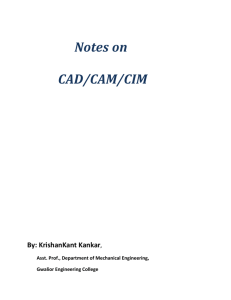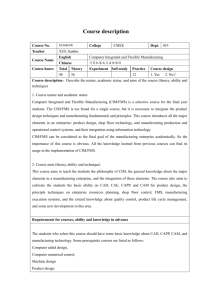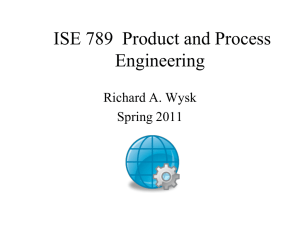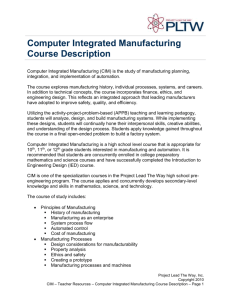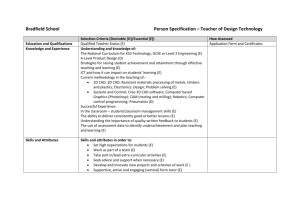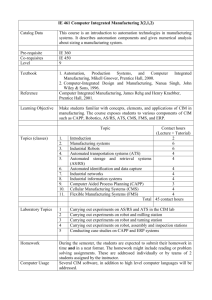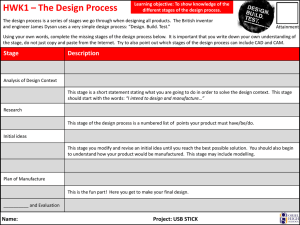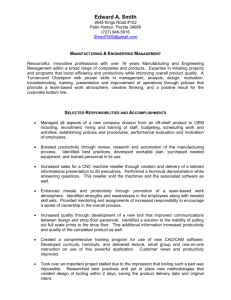Sistem Manufaktur Sistem Manufaktur Flexible
advertisement
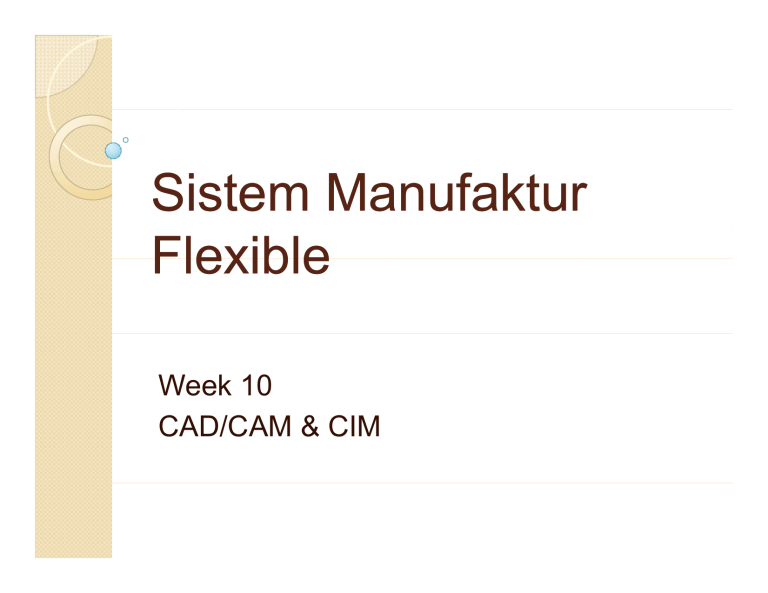
Sistem Manufaktur Flexible Week 10 CAD/CAM & CIM Pokok Bahasan CAD : Computer p Aided Design g y CAM : Computer Aided Manufacturing y CIM : Computer Integrated Manufacturing y Process Scope Produce Design Measurement/ Analysis 3D Cad Model Authority Reporting Integrated Digital Product Line Digital Product Line Today MFG Engineering NC Programming 2D D Drawing i Authority Manufacturing 2D Drawing Interpretation Quality Assurance Tooling 3D Design 3D Model Release And Authority Model Tool3d Oriented Oriented Detail Detail Assembly Assembly 3D Measurement Equipment 2D drawing 3D Model Assembly Assembly Inspection Inspection Product Product CAD – Computer Aided Design y CAD (Computer Aided Design) adalah program komputer yang digunakan sebagai alat bantu gambar/desain. manual computerize y Fungsi CAD ◦ ◦ ◦ ◦ ◦ ◦ Pengembangan design Analisis design Simulasi design Evaluasi design Automatisasi p pembuatan konsep p Perbaikan dan modifikasi design CAD software AutoCAD y Solidworks y Vericut y AutoCAD y AutoCAD adalah perangkat lunak komputer CAD untuk menggambar 2 dimensi dan 3 dimensi yang dikembangkan oleh Autodesk y Web resmi Æ http://usa.autodesk.com/ y Sejarah AutoCAD AutoCAD telah mengalami banyak perkembangan. Sejak versi 1.0 1 0 nya hingga versi terbaru AutoCAD 2010 CAM – Computer Aided M Manufacturing f i y CAM ((Computer p Aided Manufacturing) g) adalah teknologi perencanaan, pengaturan dan pengontrolan pembuatan produk dengan b bantuan t kkomputer. t Mengurangi interaksi manusia (operator) dengan mesin kerja. manual computerize y Yang bisa dilakukan dalam CAM : ◦ CAPP (Computer Aided Process Planing = persiapan pekerjaan yang dibantu dengan komputer) p ) ◦ Pemrograman NC (Numerical Control) dan pemrograman robot ◦ Pembuatan instruksi pekerjaan (peraturan kerja) ◦ Perencanaan material dan penyediaan perkakas potong dan alat-alat penjepit ◦ Dasar FMS (sistem komputer untuk pengontrolan sistem produksi yang fleksibel) CAPP – Computer Aided P Process Pl Planning i y y y CAPP merupakan perkembangan berikutnya dari CAD/CAM CAPP men-generate t perencanaan proses produksi berdasarkan geometri dari part yang akan dibuat dibuat, jumlah produksi, dan informasi fasilitas produksi yyang g tersedia. CAPP mampu memilih tool dan fixture terbaik serta menghitung biaya dan waktu produksi y Hasil design CAD dapat langsung dii t k ik diinteraksikan d dengan CAM untuk t k membuat b t sebuah produk. Data CAD Proses CAM Functional Dimensioning and Tolerancing T l i (FDT) Common Measurement Systems I Interface f Pengecekan geometri prototype menggunakan CMM (Coordinate Measuring Machine) CIM • Computer Integrated Manufacturing (CIM) merupakan istilah yang dipakai untuk menunjukkan otomasi lengkap g p dari sebuah sistem manufacturing gp plant dimana setiap proses berhubungan langsung dengan computer control dan informasi digital digital. • CIM juga mengintegrasi data production, marketing, order, d d design, i production d ti control, t l iinventory t control, t l quality control, inspection, shipping melalui communication and producing technology. Hubungan antara CAD/CAM & CIM Contoh aplikasi CIM FMS, flexible machining systems, y ASRS, automated storage and retrieval systems, y AGV, automated guided vehicles y robotics and automated conveyor y computerized scheduling and production control A business system integrated by a common data base. y CIM Model CIM CIM: conceptual rather than physical y Computer – database y Integration I t ti – Network N t k y Manufacturing – rapid development of new products y Factory Automation: partly automated but not integrated y Objectives j of CIM: managing g g enterprises y Beda Factory Automation & CIM Factory automation CIM philosophy automation optimization target unmanned factory rationalize example CMS, FMS Linking CAD, CAM, MRP element processing, material flow, CAD, CAM, CAPP, measurement, inspection, CAQC, MRP assembly, target factory enterprise focus hardware software human replacing human reorganization origin Japan USA, Europe Mengapa CIM perlu Customer memiliki keinginan g dan tingkat kepuasan yang berbeda-beda y Permintaan akan produk sangat variatif dan fluktuatif y Dibutuhkan sistem produksi yang mengintegrasi teknologi baru agar mampu merespon cepat terhadap permintaan customer. y Elements of CIM Information technology: Computer Computer, Communication, Control y Manufacturing technology: Manufacturing, Market, Management y 3Cs 3C supportt 3M 3Ms y Elements of 3Cs Computer: IT IT, OS OS, programming language, database, artificial intelligence y Communication: communication technology LAN technology, y Control: control technology, algorithm y Targets of CIM Developing p g high g q quality yp products with low cost y Integration and control of product design and manufacturing processes y Easy financial management y Increasing volume of sales y Function of CIM 1) Order information and automatic scheduling through computer - dealing individual orders of various products - control of due dates - preparing production planning 2) Inventory control through JIT - minimizing raw material, WIP, inventory - utilizing bar code, RFID 3)) Statistical q quality y control - quality improvement 4) Monitoring facility, facility process - data collection for facility operating - reportt for f producing d i d defective f ti goods d - records & analysis of failing facility 5) Data collection for MIS - WIP data - shipment data - direct & indirect labor data - production control data ; defective rate operation rate, rate, rate failure rate, rate production rate - supplier record; quality quality, acomplishment - defective d f ti production d ti d data t 6) Managing MIS Data - reducing indirect cost - rapid decision making using database 7) Diagnosing failure g down time - minimizing - details of failure (problems) 8) Managing Technical Data, Document - managing S/W program - tool life data - quality data - product history - document update 9) Standard (ISO) CIM Hierarchy 1st Level: p production facility y CNC, Robot, PLC y 2nd Level: Work Cell controlling 1st level activity applying l i d data t tto process, production, quality control y 3rd Level: Area level managing several lines production d ti plan, l ffacility ilit maintenance scheduling, h d li assigning i i material, t i l facility y 4th Level: Factory level controlling function of whole factory, inter factory sales control inter-factory control, wages wages, finance, long term production plan, marketing customer services marketing, y S l Selesai i Terima Kasih
